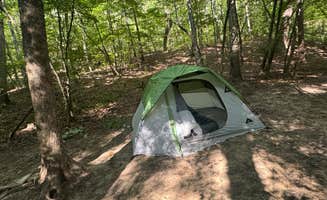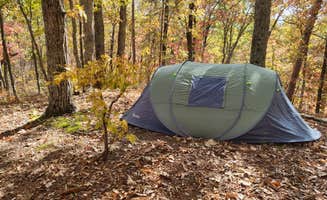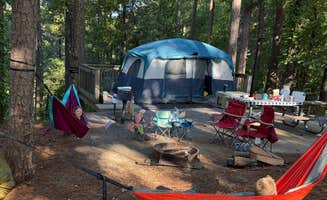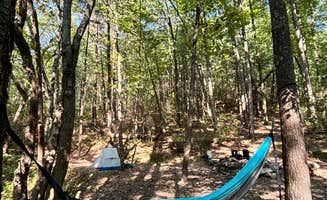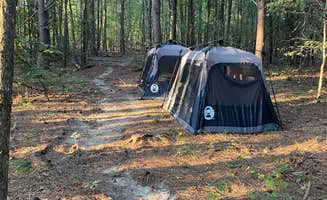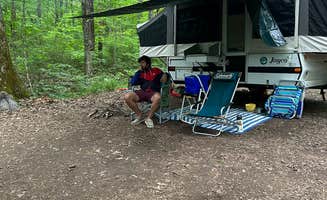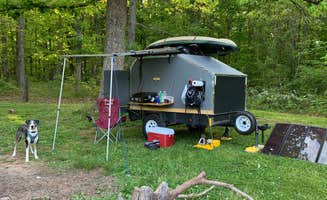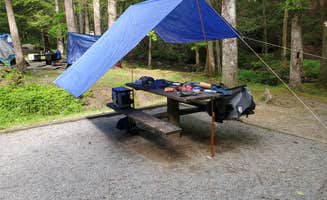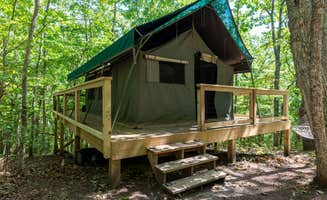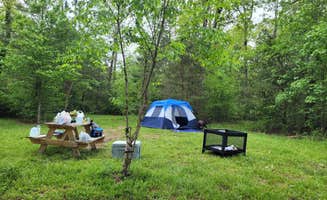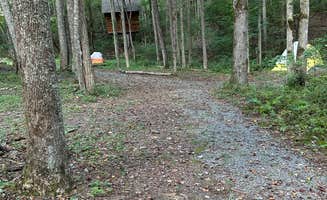Tent campsites near Calhoun, Georgia range from free dispersed sites to established campgrounds with basic amenities. The area sits at elevations between 700-1,600 feet in the foothills of the Appalachian Mountains, with summer temperatures averaging 85-90°F and winter lows frequently dropping below freezing. Camping options typically follow a first-come, first-served system requiring Georgia land passes for Wildlife Management Areas.
What to do
**Creek exploration: Blue Hole Dispersed offers swimming opportunities in the warmer months. As visitor Julia B. notes at Hickey Gap: "There's a giant waterfall down the trail if you can make the trek. There's no cell service or security so make sure you're making safe decisions."
**Cave visits: Crockford-Pigeon Mountain WMA provides access to underground exploration opportunities. "We stayed 3 days 2 nights here in our 21' pop up camper with our generator. Road is pretty well maintained, spots are good size, some only large enough for tent/car camping. We were never bothered and it's right down the road from blue hole and Ellison Cave trail," reports Ava R.
**Night sky viewing: Bring binoculars for stargazing from primitive camping locations. Ney N. describes their experience at Woodring Branch Primitive Campground: "We walked down the peninsula at night to stargaze surrounded by water. I didn't want to leave and go back to the real world."
What campers like
**Creek-side sites: Many campers appreciate tent sites near flowing water. Mike H. shares about Hickey Gap: "This was a beautiful little spot next to a creek. There are 5 sites in all. It was a Monday in August, and there were two spots available."
**Waterfall access: Several camping areas provide hiking access to waterfalls. John B. explains: "There is a beautiful waterfall about a mile down trail from camp and tons of great swimming areas!"
**Affordable fees: Most primitive sites are free or very low cost. As Ney N. describes Ridgeway Park: "$10 a night was a bargain and I did not expect much. The site we picked was near the restrooms, which were very well kept. It was quiet, beautiful, and an absolute slice of heaven."
What you should know
**Land pass requirements: Georgia Wildlife Management Areas require permits. Sarah H. points out: "Land pass required. No alcohol is permitted. This is a wildlife management area. The camp sites are first come, first serve. They are free. Only 2 sites with tables."
**Varying road quality: Access roads can challenge vehicles, particularly after rain. Mitchell M. warns about Sawmill Lake Campsite: "The road leading up to the campsite is extremely rough and washed out. We were in a Subaru Outback, and it was a very slow-going, bumpy ride — we bottomed out several times."
**Wildlife encounters: Prepare for possible wildlife encounters including snakes and ticks. Bob P. reported: "Very nice CG with picnic tables, pit toilet and trash can. I saw 3 copper heads at the creek." Another camper noted getting four ticks after briefly stepping out of their vehicle.
Tips for camping with families
**Site selection: Choose tent sites based on needed space and proximity to facilities. Suzanne-Will C. advises: "I love that this was a tent only camping site (no RVs). The sites were a bit smaller than I would have liked but as it was just the 10 sites on the road, the kids could safely play in the road."
**Water source planning: Many primitive camping areas lack drinking water. At Serenity Ridge, some amenities are available: "You don't need camping gear. A tent or two can be set up, ready for you. Cooler stocked with ice. Firewood stacked by the fire pit, ready for you to roast hotdogs or s'mores!"
**Weather preparation: Summer temperatures can exceed 90°F while spring brings frequent rain. Mike H. shares this practical tip: "There was a pit toilet with plenty of toilet paper and it was quite clean. There's also a bear box and signs clearly indicating there are bears around and that you should keep all food in your vehicle or use the box."
Tips from RVers
**Campsite access: Some forest roads require high clearance vehicles. Sierra Y. from Hidden Creek Campground notes: "Stayed 13 days. I came from the west and had no problems getting my 23ft camper up the mountain. There were a few people that stayed in a tent for a night or two here and there, but I didn't see any other RV/Campers so every spot was open."
**Direction matters: Consider your approach route when bringing larger vehicles. Mitchell M. advises: "If you have a trailer or rv I recommend coming in from the west direction, if you can tell from maps. The east way had 180 degree sharp turns up the mountain, so may be difficult."
**Site selection: Check terrain before selecting campsites in remote areas. As Robyn W. describes: "We went right which goes up, passed an open gate followed the road LOTS OF DEEP POTHOLES. The road then opens up to a four way, we kept going straight, followed the road down and then came to three sites all empty."


